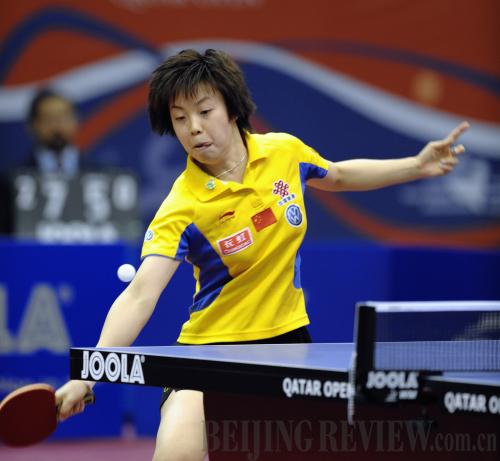|
 |
|
PING PONG STAR: Zhang Yining competes in the women's final at Katar Ping Pong Open in February 2009. Zhang graduated from Shichahai Sport School and has won many world championship titles (CHEN SHAOJIN) |
A well-oiled machine
Upon entering the facilities, one is met with the sound of body blows, whizzing shuttlecocks and panting athletes. These are the sounds of the Shichahai machine, whirring at full capacity.
The facilities are well maintained but far from fancy, with nothing to suggest that visitors are in one of the country's most affluent sporting centers. Every yuan given to Shichahai goes toward the state-of-the-art equipment, decorated coaches and hi-tech sports science, making the school the envy of the sporting world. Even the Chinese flags adorning the walls provide a reminder of Shichahai's purpose: churning out champions.
Steve Roush, former chief of sports performance for the U.S. Olympic Committee, said China's sporting success can be attributed to their training methods. Roush told NY Daily News that in China "there's no rush to get kids playing games the way there is in our country. The emphasis here is on skill development."
And this is exactly what is happening at Shichahai. The key to success appeared to be repetition, with coaches favoring technique over actual competition.
The tiny ping pong players are fed ball after ball, slapping each of them back in turn. Not every shot hits the table, mind you. But that is hardly the point.
For Shichahai, hitting 1,000 balls is better than hitting 100. And when one basket of balls is finished, the students do it all over again.
This work ethic is the backbone of everything the students do at Shichahai. The school's 600 or so students rise at 6.30 a.m. for six hours of training each day. Coaches and teachers control everything from students' diets to when they can visit their families.
A fresh start
Prior to the 2008 Beijing Olympics, this commitment was criticized by the international media. Rumors of beatings and photographs of small children crying during their training sessions circulated on the Internet.
These allegations subsided, however, after the Beijing Olympics, with AFP reporting that following China's record-breaking medal haul, a more balanced training regime was installed.
Shi acknowledged this, saying that Shichahai has shifted its focus from sheer quantity of training hours to developing more effective and efficient coaching methods.
"What we focus on now is the training quality," Shi said. "We get coaches involved in scientific research groups which train them to improve a student's performance in less time than before."
A crucial development has been the recognition that athletes require more downtime. When China's star hurdler, Liu Xiang, broke down at the London Olympics four years earlier, it was widely asked: Have Chinese athletes been overworked?
Shichahai gymnastics coach Jiao Gengbo told AFP that he now tries to strike a balance between students' time at the gym and time to themselves.
"I think it's really just about being rational. To train excessively is not the right way," he said. "We need to spend equal time in studying, relaxing and training."
Yet this does not mean that Shichahai has lost its competitive edge. The approach may have changed but the goals are exactly the same. Shichahai students are not interested in simply competing; they are here to become champions.
"I want to go to the Olympics. I can play table tennis well, so this is my dream. I can win the gold medal," Yu Zhengyang, 11 years old, told AFP.
For Yu, the expectations of the government are irrelevant. With one eye set on the 2020 Olympics, Yu's biggest source of pressure does not come from his coaches or the government but from himself.
If anyone had any doubts that Shichahai's new attitude had affected the professionalism of the school, they were silenced following a demonstration from some of the school's martial arts champions.
Graceful and fearsome, the performances showcased Shichahai's finest quality: its commitment to excellence. They more than lived up to their reputation as the country's preeminent martial artists.
Jim Scherr, former chief executive of the U.S. Olympic Committee, told NY Daily News in 2008 that China's sporting academies are "going to be a formidable system we're going to have to contend with for a long, long time."
Four and a half years on, and this does not look set to change.
The author is an intern at Beijing Review
Email us at: liuyunyun@bjreview.com | 